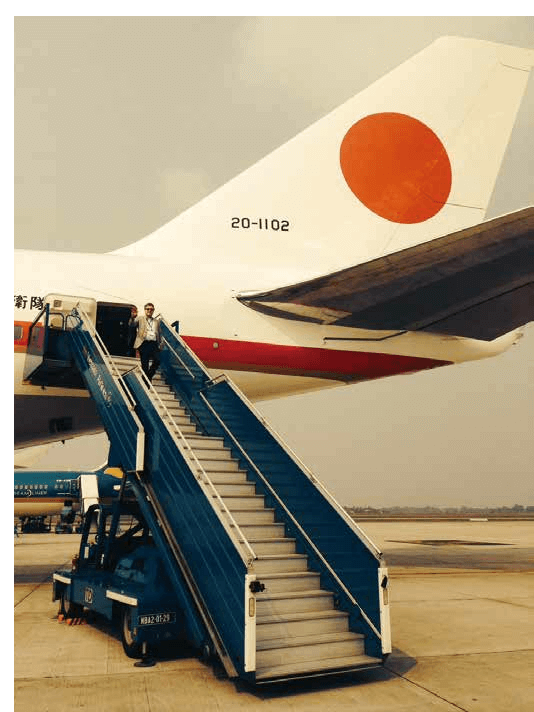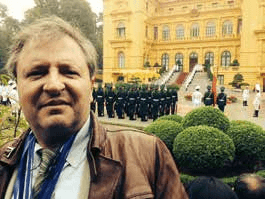Issue:

The emperor’s buon viaggio
As the only foreign correspondent on Emperor Akihito’s recent trip to Vietnam, this Italian journalist had much to think about.
by STEFANO CARRER
“On the day before departure, please come at 11 a.m. sharp to the Sakashitamon entrance of the Imperial Palace.” With that surprise message from the Kunaicho, the Imperial Household Agency, I found out that I would be the only Western journalist, along with 126 colleagues from Japanese news organizations, to cover the historic first visit by a Japanese monarch to Vietnam.
That also meant being included in the restricted group that would receive the imperial couple’s prevoyage greetings. But any gratification was dampened by the necessity of attending two excruciatingly long briefings and the reception of over 200 pages of detailed written instructions. I cannot imagine 127 Italian journalists attending a three hour briefing of the sort after 10 minutes, I believe, the scene would have looked like herders desperately trying to corral 127 cats.
I expected the meeting at the Imperial Palace to be very formal. So when Akihito and his consort entered the Shakkyo room surrounded by wood, shoji and a large painted lion related to the Noh theater but with no furniture at all I dutifully joined the collective deep and long bows.
Moving in gracious slow motion or as still as a statue, Empress Michiko appeared as timeless a figure as a noblewoman from the Heian epoch. On the contrary, the emperor’s facial features betrayed a hint of irony that made him seem very modern. After the official greetings and short reciprocal speeches, we all “broke ranks” as attendants brought coffee, tea and biscuits on trays. Akihito sipped a coffee while standing and talking informally with those who approached him.
When introducing myself, I recalled the visit by Giorgio Napolitano in 2009, when the Italian president, who had already met Akihito, greeted him with a vivid “Buongiorno Imperatore, come sta?” Later that day, Akihito went with him to see an Italian opera for the first time, arriving at the start of the third act of Verdi’s Don Carlos. It was precisely the moment beginning with the famous aria “Ella giammai m’amo,’” or “She never loved me,” showing the monarch of Spain in a moment of regret, bitterly complaining about how burdensome it is to be a sovereign. The irony, I’m sure, was not intentional.
I LEFT THE ROOM with a small confirmation of Akihito as the “emperor of the people.” After all, this is a son of a god who became a human being, since his father Hirohito was considered divine before the Americans induced him to renounce the highest holiness and to state his human nature. The present emperor has a number of firsts under his belt: first to marry a commoner, to speak on TV following the devastating tsunami in order to encourage the suffering ordinary people, to suggest the taboo of an affinity with the imperial line in Korea, and to pray for the souls of fallen American soldiers in Saipan. Even in full compliance with the constitutional limitations, he has acquired a rather “liberal” aura.
The trip to Vietnam was the emperor’s 28th overseas voyage, and it could well be the last, so I was lucky to be able to report on how serious a matter his departure from Haneda Airport was. When the imperial couple walked down the red carpet toward the State Boeing 747, past a lineup of the prime minister and his wife, as well as imperial family members not making the trip, my foreign eye was impressed by how deeply Princess Masako bowed to her father in law. Even more impressive was watching the double bow of mother Michiko to her first son, Crown Prince Naruhito.
According to some rumors, one of the reasons for Akihito’s desire to abdicate is his wish to facilitate the transition to the throne for his son. Naruhito is necessarily less charismatic a figure, said to be somewhat affected by the psychological problems of his wife. Conservatives have grounds to fear that Naruhito too carries “liberal” sentiments.
Such were my thoughts while boarding the State Boeing. It was the first time I’ve boarded before paying the fare, but I guess I was trusted (the bill came a month later). Inside, even the seats for journalists were clearly business class. During the journey, every journalist was supposed to read the latest package of documents that were handed out at the airport. Included were maps of each floor of the hotels where we were to stay, with clear indications of the emergency exits (for each floor). An entire sheet of paper was dedicated to the time zone difference, and it was not enough to point out that Vietnam is two hours before Tokyo time. Instead, we got a complete table advising us that when it is 11 o’clock in Japan it is 9 o’clock in Vietnam, 12 corresponds to 10, and on and on and on.
AT THE PRESIDENTIAL PALACE in Hanoi, looking at the imperial face filtered by the shadows of the bayonets of the Vietnamese soldiers parading with goose steps, I could not help but notice a respect that never turned into enthusiasm. (This seems contrary to the present prime minister, who seems to enjoy the pomp of military parades.)
Burdens and ironies from a painful history were likely affecting the first Japanese emperor traveling to this country. Akihito laid a wreath at the mausoleum of Ho Chi Minh, who won the war with the U.S. during which the Americans used the Japanese archipelago as their main logistics base territory.
A most moving moment was the meeting with the 93 year old widow Nguyen Thi Xuan, who had married one of several hundred Japanese soldiers who remained in Vietnam and joined the fight for independence. After the French were defeated in 1954, they were sent back to Japan with no thanks, without their wives and children. (Many of the children suffered from discrimination, and called sons of “the fascists”).
“You have had a very difficult life,” the emperor told the widow. “I deeply sense your pain.” Empress Michiko bowed almost to the ground, taking her hands and consoling her, cheek tocheek.

Opposite, the author descending the steps of the State Boeing 747; left, at the presidential Palace in Hanoi
That led me to think about the Japanese rule which forbids any physical contact with the imperial couple. The former Italian president Sandro Pertini, during his official visit to Tokyo in 1982, was the only one who dared to give a strong pat on the back of Hirohito. But Pertini the most beloved of the Italian chiefs of state was a unique character, absolutely allergic to strict protocols. Instead of being horrified, the Kunaicho staff should have welcomed that friendly pat. It represented a forgiveness of sorts. Pertini had been languishing in jail for several years for antifascist activities when the dictator Benito Mussolini signed the Tripartite Pact with Hitler’s Germany and Hirohito’s Japan.
Another quite interesting encounter was Akihito’s meeting, after more than 40 years, with an old acquaintance at the Biology Museum in Hanoi. It was a white goby, a species that the emperor had discovered as a young scholar on a tributary of the Can Tho River and donated to the museum in 1976.
There were other events scheduled, including one inside the imperial citadel of Hue, where the imperial couple witnessed a performance of Nha Nhac music and traditional Vietnamese dances. A monk of the Champa region, Phat Triet, introduced the style to Nara, and it was later incorporated into Japan’s gagaku, proving that even a quintes sential Japanese artistic expression like court music has some foreign roots!
MANY COMMENTATORS DRAW PARALLELS between the first Japanese emperor in 200 years who is going to abdicate and Benedictus XVI, who in 2013 became the first pope to relinquish his duties in some 500 years. But there are substantial differences. The pope in Rome enjoys absolute powers: he has no need to ask permission. (And, by the way, if he did, traditionalist Catholics would have never allowed him to resign.) He can also make impromptu statements or answer questions from journalists on the Alitalia plane which takes him to foreign countries, though the Vatican press office must sometimes do some “damage control” management.
The Japanese emperor, I discovered, is not supposed to talk freely with the press: it would be too risky according to the Kunaicho standards. Though we had one or two briefings a day by the Kunaicho or Gaimusho officers (respectively, in Japanese and in English for the Vietnamese press), there was no chance to ask questions directly to the emperor.
On several occasions I found myself very close to the emper or. Nobody actually told me not to talk to him: it was so taken for granted that there was no need to highlight the point to a correspondent based in Tokyo that I grudgingly agreed not to be found guilty of lèse majesté which got me wondering if I have gone too far in absorbing the Japanese mindset. I settled my internal turmoil by recalling the first lessons of criminal law at Milan University: despite my professional urges, pretending ignorance would never constitute an excuse for a crime.
I was an object of curiosity among the Japanese colleagues: they wanted to know why I was with them, what I thought about the emperor and what I would report on. Not being a member of the Kunaicho kisha club, of course, I sometimes tried to circumvent the rules. Accredited as a pen journalist, I was not entitled to take pictures or moving images. So on a number of occasions I slipped out of the group to shoot from public places: after all, only the Vietnamese police could have stopped me there.
Some friends in Italy begged me to take a selfie with the emperor. But while I was momentarily tempted by this suggestion, I ended up deciding not to contribute to a further lowering of gaijin reputations.
But it was in front of the crowds of hundreds of flag carrying Vietnamese that it suddenly dawned on me how important Vietnam was to the world. It was this country after all that indirectly decided the outcome of World War II. In that fateful summer of 1941, the Japanese decided not to attack Russia, as the Nazis had asked them to do, and instead to invade South Indochina. It was a decision that prompted the American embargo and the later attack on Pearl Harbor. Moscow was saved and the U.S. entered the war. It was the turning point of the conflict, the beginning of a new era. For me, in the end, covering the emperor’s trip was not only an interesting experience, but a great lesson in world history.
Stefano Carrer is the Tokyo correspondent of Il Sole-24 Ore, the Italian economic daily.

